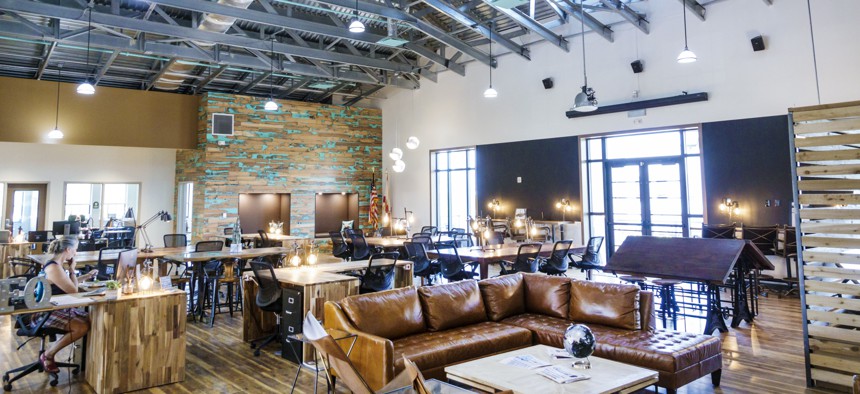Nurturing Entrepreneurship Boosts Economic Growth

A small business incubator in Florida. Jeffrey Greenberg/Education Images/Universal Images Group via Getty Images
COMMENTARY | States should direct more money from incentives to small businesses and entrepreneurs and less to attracting large companies.
Entrepreneurship and small business have consistently created the majority of net new jobs in the country. Still, transformational economic growth is often equated with a region’s success in attracting large companies. Encouraging an entrepreneurial mindset and nurturing people and local businesses goes a long way to growing and sustaining communities—more than we give it credit.
Entrepreneurship creates the kinds of jobs and revenue we need today. Attracting new, big national and international corporations to a community can take years when you consider the time it takes to recruit, build a facility, and get it up and running.
According to Thom Ruhe, president and CEO of NC IDEA, a private foundation committed to helping people in North Carolina realize their full entrepreneurial potential, the state saw a record number of new firm filings in 2020—44,000—that were deemed likely to generate jobs. Assuming these small businesses only hire a few employees, that’s potentially hundreds of thousands of new jobs created by new entrepreneurs.
Now compare that to the estimated 3,000 researchers expected to be hired by Apple in North Carolina—a significant number of jobs, but at the steep price of almost $1 billion in tax incentives. It will take a long time, if ever, for the region to make that money back.
What if we invested a fraction of the incentives large companies receive in entrepreneurs instead? What if we devoted more resources to the entrepreneurial ecosystem overall?
New entrepreneurs face significant obstacles. At least 81% of entrepreneurs do not qualify for a bank loan and 99% will not attract venture capital—instead, they’re funding their businesses with personal net worth, family wealth or connections to networks. Only 2.6% of venture capital dollars went to African-American and Latino founders in 2020. And about 2% of venture capital dollars went to women founders in 2021.
Entrepreneurs are motivated to succeed and it’s in a region’s interest to support those efforts. If the money for incentives to major corporations were made available to entrepreneurs and the entrepreneur support organizations that help them succeed, it would help bridge the access to capital issues they face and help create more equitable opportunities.
The Nussbaum Center for Entrepreneurship, a business incubator in the Piedmont Triad region of North Carolina, is one example of what an entrepreneurial support and growth enterprise looks like. The Nussbaum Center offers office, assembly, lab and data room space to support small business during their development and has seven entrepreneur support organizations on-site who provide business coaching on topics ranging from human resources, accounting, and exports to accessing capital, applying for grants, and connecting businesses to military defense-related ventures.
Several thousand verified jobs have been created by companies that began at the Nussbaum Center. According to our internal reporting, these companies have generated an estimated $123 million in revenue and $60 million in payroll over the past decade. Seventy-two percent of businesses currently in residence are minority- and women-owned businesses, and the number of Black women-led businesses (28%) equaled the number of white male-led businesses.
Small businesses are the foundation of our economy and our communities. The Nussbaum Center’s success is proof that this model for nurturing homegrown companies works, a model we’ll apply with our up-and-coming Steelhouse redevelopment project.
The Steelhouse, adjacent to the existing Nussbaum Center, is a major redevelopment project in North Carolina that will revitalize a massive historic Carolina Steel structure, and we believe will create approximately 600 permanent jobs and 150 construction jobs. The project will convert the existing raw space into flexible, scalable spaces that meet the needs of manufacturing entrepreneurs, food producers and the neighboring community. In the past year, it has received a combined $6 million in funding from city, county and federal governments.
While the pieces are in place to support entrepreneurs, we still need to incentivize them more, knock down the barriers to success, and provide the education, resources and support services that promote an entrepreneurial mindset. State and local governments should devote a portion of their economic development budgets—money that is now set aside for tax credits, grants, loans and other incentives to lure large companies—to entrepreneurs, entrepreneurial support programs and venues that can potentially create a more stable, diverse job base and strong local economies.
Sam Funchess is the CEO of the Nussbaum Center for Entrepreneurship. Lisa Hazlett is the president of the Nussbaum Center for Entrepreneurship.
NEXT STORY: Treasury Reopens ‘Help Desk’ for States and Localities





